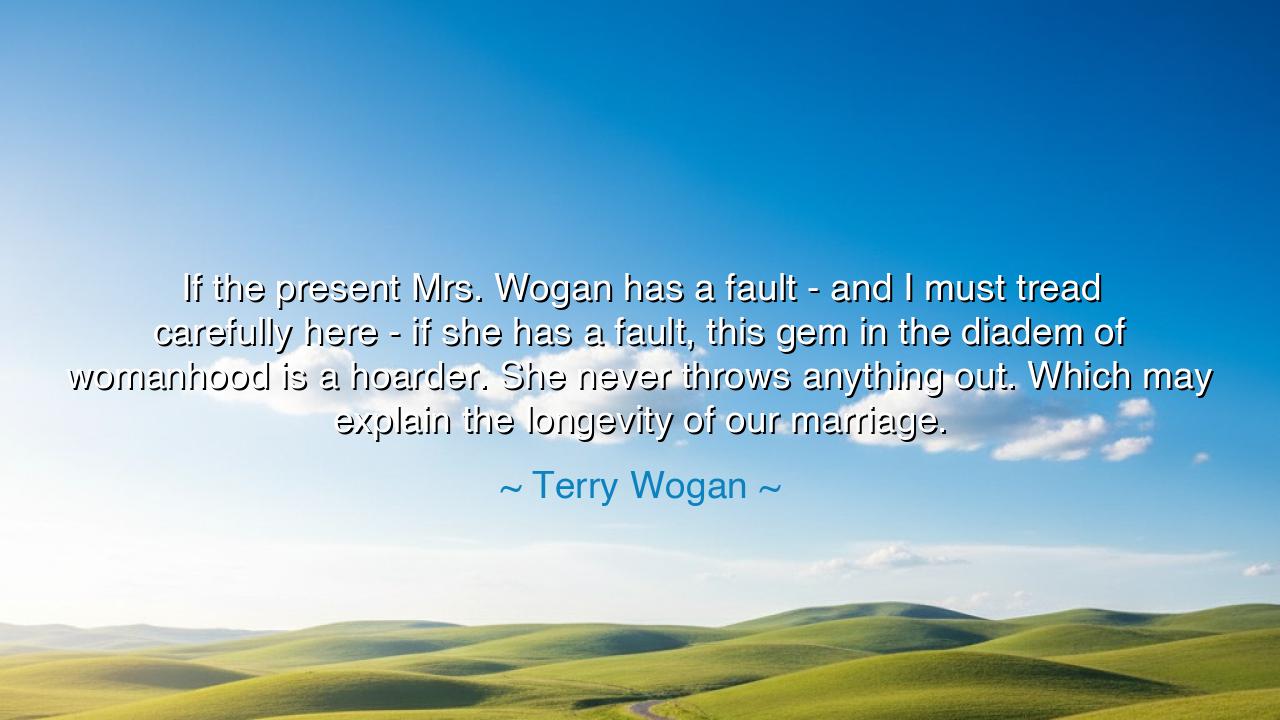
If the present Mrs. Wogan has a fault - and I must tread
If the present Mrs. Wogan has a fault - and I must tread carefully here - if she has a fault, this gem in the diadem of womanhood is a hoarder. She never throws anything out. Which may explain the longevity of our marriage.






Hear now the gentle wit of Terry Wogan, beloved voice of radio and television, who said with laughter and tenderness: “If the present Mrs. Wogan has a fault—and I must tread carefully here—if she has a fault, this gem in the diadem of womanhood is a hoarder. She never throws anything out. Which may explain the longevity of our marriage.” Behind the sparkle of humor lies a truth that speaks to the endurance of love, the power of loyalty, and the quiet virtues that sustain a lifelong bond.
At first glance, his words jest at his wife’s habit of hoarding, of holding on to possessions that others might cast away. Yet beneath this playful remark lies a profound metaphor. To hold on to things is also to hold on to people, to promises, to the sacred bonds of marriage itself. The suggestion that she “never throws anything out” becomes a symbol of steadfastness—the choice not to discard what is difficult, not to abandon what is worn, not to treat a marriage as something disposable. Thus, the so-called “fault” reveals itself as a hidden virtue, a trait that has preserved their union.
The origin of Wogan’s jest lies in the tradition of Irish storytelling, where truth is often veiled in humor, and humor is used to reveal truth. He knew that to speak earnestly of love might sound too solemn, but to speak of it in laughter would let the truth slip gently into the heart. By calling his wife a “gem in the diadem of womanhood,” he honors her with regal imagery, even as he teases her with affectionate satire. The balance of reverence and play is itself the secret of many lasting marriages.
History too gives us examples of such loyalty. Think of Abigail and John Adams, whose marriage endured decades of separation during the American Revolution. They wrote letters, preserving not only their words but their devotion. Like Mrs. Wogan, they “never threw anything out”—not their affection, not their commitment, not their patience. It was this tenacity, this willingness to keep and to cherish, that gave their union its strength. Marriages that endure are not those free of flaws, but those where flaws are held with humor, and virtues with gratitude.
The quote also teaches us that what the world calls a fault can become a foundation. In a time where many discard relationships at the first sign of wear, Wogan’s jest reminds us that there is wisdom in holding on. To “hoard” in this sense is to treasure, to preserve, to refuse to cast away what still carries value. The longevity of his marriage is explained not by perfection, but by the refusal to throw away the imperfect.
O children of tomorrow, hear this lesson: love is not sustained by novelty, nor by endless pursuit of what is new. Love endures because it remembers, because it holds on, because it refuses to discard the bond when storms arise. What seems trivial—a habit of saving, a refusal to throw things away—may in truth symbolize the deepest virtue of all: constancy.
What then must you do? If you desire a long marriage, learn to cherish rather than discard. Laugh at faults instead of resenting them. Hold fast to your promises as you would to treasure, and do not cast them aside in the heat of anger or the cold of boredom. See in your partner not perfection but permanence, not flawless beauty but enduring worth. In this way, your marriage too may be a diadem, and your union a crown of years.
Thus the words of Terry Wogan, light with jest yet heavy with wisdom, remind us that the secret of longevity in marriage is not in constant renewal, but in the art of holding on. Treasure what you have, endure with patience, and laugh with love—and your marriage shall be not a tragedy of discarding, but a triumph of keeping.






AAdministratorAdministrator
Welcome, honored guests. Please leave a comment, we will respond soon